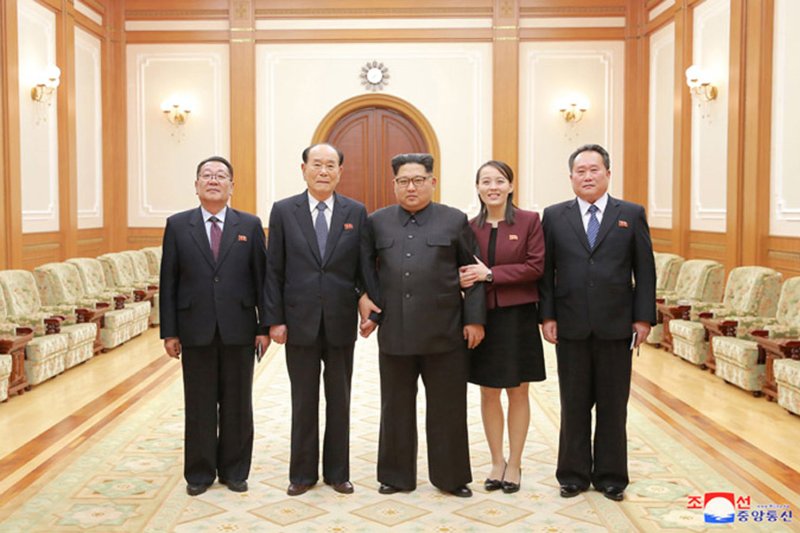This image released on February 13, 2018, by the North Korean Official News Service (KCNA), shows North Korean leader Kim Jong Un meeting with his sister Kim Yo Jong, second right, and ceremonial head of state Kim Yong Nam, second left, following their visit to South Korea to attend the opening ceremony of the 2018 Winter Olympics. Photo by KCNA/UPI |
License Photo
SEOUL, Feb. 13 (UPI) -- North Korean leader Kim Jong Un's conciliatory posture toward the South follows a string of staggering global sanctions on the regime, a Seoul official told Dong-A Ilbo Tuesday.
Four rounds of United Nations Security Council sanctions were imposed on Pyongyang since June last year, clamping down on the regime's major export items and dramatically cutting oil supplies, as well as curbing its inflow of foreign currency earnings.
The latest measure, Resolution 2397, adopted in December after the North conducted its Hwasong-15 Intercontinental Ballistic Missile test, includes reducing the regime's imports of refined petroleum products almost 90 percent, which could further exacerbate the country's fuel crisis.
A Wall Street Journal report suggested the North scaled back its annual military exercise this winter, due to the lack of fuel.
While North Korea's long-time allies China and Russia had previously opposed imposing tough UN sanctions on the regime, the two countries did not object when voting in the series of resolutions last year, deeming Pyongyang's continuous nuclear and missile provocations unacceptable.
Beijing has begun enforcing U.N. sanctions, banning financial transactions with the North and shutting down North Korean businesses in its borders as well as clamping down on trade.
North Korea's exports to its biggest trade partner China amounted to $1.7 billion last year -- a 33 percent drop on-year. China-bound shipments fell 83 percent on year, in December alone, according to Beijing's customs agency.
North Korea's coal and mineral exports were reportedly reduced by 30 to 40 percent within a year, according to a U.N. sanctions report.
Meanwhile, Moscow is preparing to send home tens of thousands of North Korean guest workers in its borders, in line with U.N. sanctions aiming to cut off the flow of remittances to the regime.
With Washington continuing its campaign of maximum pressure on the North, the impact of global sanctions are likely to hit even harder.
United States Vice President Mike Pence hinted last week that Washington is set to impose stronger-than-ever sanctions on Pyongyang.
"With the biting impact of sanctions set to hit home, Kim Jong Un is trying to cushion the blow with the 'Pyeongchang charm offensive,'" said National Security Adviser Chun Yung-woo, referring to the North's sudden decision to participate in the Pyeongchang Winter Olympics and strike up inter-Korean dialogue and exchange.
A number of South Korean experts believe Pyongyang wants closer ties with the South to weaken international sanctions and to increase its leverage in negotiations with Washington.
Meanwhile, the North criticized U.N. sanctions on Monday, calling them "despicable" and "criminal" and enacted with the intention "of suffocating" individuals' livelihood and public health.
According to a statement obtained by CBS News, the North's U.N. mission blamed the U.S. for spearheading the sanctions.
"This clearly proves that the U.N. Security Council, overpowered by high-handedness and arbitrariness of the U.S., has only turned into the tool of infringement upon people's right and barbarous state sponsored terrorism," it said.
The statement also warned, "Before it is too late, the U.S. has to recognize the world recognized prestige of the DPRK which rapidly emerged as a strategic state."















